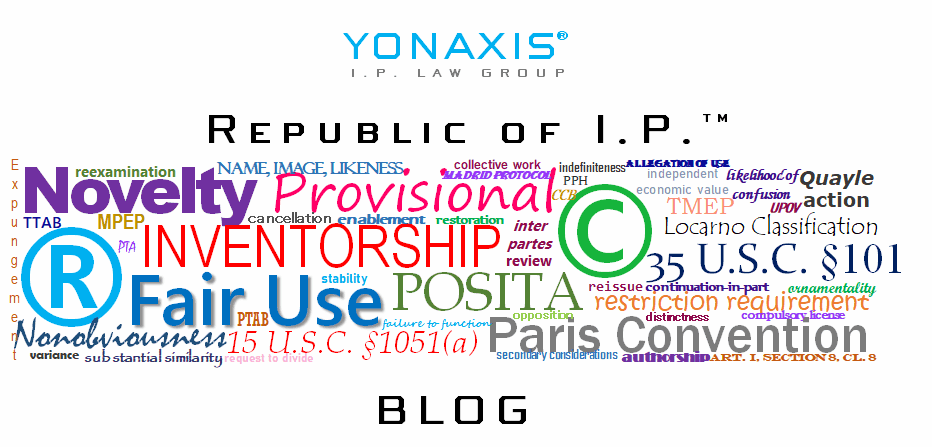On July 23, 2019, the Court of Appeals for the Federal Circuit publicly released an intriguing design patent ruling involving design patents covering Ford’s F-150 truck. In Automotive Body Parts Assn. v. Ford Global Techs., LLC,[1] the Fed Circuit declined to expand trademark law’s functionality doctrine to design patent law, and also declined to create …
Category: trademark
SCOTUS Watch: Bar on Immoral and Scandalous Marks Violates First Amendment
On June 24, 2019, the U.S. Supreme Court handed down Iancu v. Brunetti,[1] dealing with the Lanham Act’s Section 2(a) bars to trademark registration’s collision against the First Amendment brick wall; the Justices in a 6-3 vote struck down the immoral and scandalous clause of §2(a) in a somewhat mixed-up and divided Court. Brunetti is …
CannabIP: Second Circuit Refuses to Dismiss CBD Reclassification Case
On May 30, 2019, the Court of Appeals for the Second Circuit in Washington v. Barr,[1] refused to dismiss outright a case where the plaintiffs alleged marijuana’s classification on the Drug Enforcement Agency (DEA)’s Schedule I list of the Controlled Substance Act (CSA) of the poses a “serious, life-of-death threat to their health.” The Second …
CannabIP: Developments in Cannabis Legalization and Effect on IP
As the new year opens, there have been some developments in legalization of cannabis use, both medicinally and recreationally. First, on the international front, South Korea legalized cannabis for medical use in late 2018. The South Korean National Assembly passed legislation to amend the Drug Narcotics Act to allow for the sale, import, and export …
CannabIP: State of Federally-Registered Cannabis Marks
As we leave 2018 behind us, there were a number of high-profile states and countries which entered the adult-use cannabis marketplace. More cannabis companies, formerly illegal, find themselves now legal in the streams of commerce. However, cannabis product-specific applications for trademarks and service marks remain elusive as the USPTO has maintained a fairly strict examination …
Government Shutdown Effect on IP Offices
At midnight on Friday, December 21, 2018, the U.S. government entered a partial shutdown, which means all non-essential federal departments will close operations until funding has been appropriated by Congress. This includes national parks, NASA, and federal agencies. Those exempt include airports and the U.S. Postal Service, which will continue normal service through Christmas Eve, …
CannabIP: U.S. Patent No. 10,028,987 B1
U.S. Patent No. 10,028,987 (‘987) issued on July 24, 2018, for “Cannabis-Infused Milk.” It was issued to inventor Dylan Pillsbury, of Dos Rios, California. The applicant/assignee is Chocowaska Cooperative, Inc., a cannabis-infused edibles and hemp company. The claims are directed to a method of preparing and processing milk infused with cannabis, which includes heating the …
Fed Circuit Watch: Dangers of Pro Se Representation – Failure to Understand Procedural Rules
On August 27, 2018, the Court of Appeals for the Federal Circuit issued a rare trademark ruling, Zheng Cai, dba Tai Chi Green Tea Inc. v. Diamond Hong, Inc.,[1] dealing with the more mundane aspects of proper filing procedures and rules of evidence. It also served as a reminder of the dangers of USPTO applicants …
Fed Circuit Watch: TTAB Fails Genericness Test
In a rare review of a Trademark Trial and Appeal Board (TTAB) case, the Court of Appeals for the Federal Circuit vacated and remanded the decision in Royal Crown Co., Inc. v. The Coca-Cola Co.,[1] involving the doctrine of trademark genericism. The Fed Circuit panel found fault with the TTAB’s analysis of the test for …
CannabIP: FDA Approves First Drug with CBD Active Ingredient
On June 25, 2018, the Food & Drug Administration (FDA) issued a press release in which it approved EPIDIOLEX® for treatment of epilepsy, Lennox-Gastaut syndrome, and Dravet syndrome. Lennox-Gastaut syndrome (LGS) is specific type of epilepsy characterized by multiple seizures and affects intellectual development in children. Dravet syndrome is a severe form of epilepsy, a …
